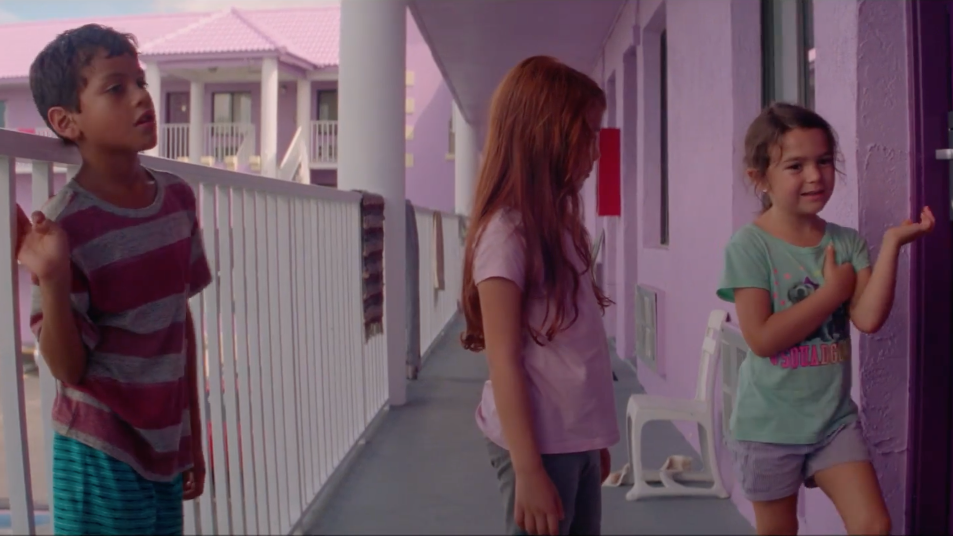Review: The Florida Project
The cinematic landscape has barely recovered from 2015’s vivid IPhone odyssey Tangerine. Seemingly summoned from the brightest rays of Hollywood sun, Sean Baker’s Christmastime portrait of working girls brought vérité texture to frequently marginalized people and landscapes, invigorating unseen American corners through truthful emotional dynamics, empathetic depiction, and a startling, visceral jolt to independent aesthetic. And just while we’re getting back up, he drops this on us, and it’s a doozy. The Florida Project, Baker’s newest endeavor (opening in limited release on October 5th), evolves his successes into the realm of fantasy.
Touted in numerous Q&As as “his version of The Little Rascals”, Sean Baker’s sixth feature film is a Kids Movie (as in, a movie *about* kids, not necessarily a ‘kids film’), a magical realist escapade, a dollhouse showcase, and a gateway into the ever-present ‘hidden homeless’; and the resulting concoction bubbles like a fizzy pop soda fountain against a crumbling topography.
Starring Brooklynn Prince, Willem Dafoe, and Bria Vinaite, the film, set in a capitalizing, knock-off piece of Florida (right outside Disney World), explores a ‘Magic Kingdom’ and its array of guests, focusing on three children and their parental relationships. The decay on screen is refracted through the adventures of the kids, and their moments are built as artificial constructions; fragmented, playful scenarios captured in defiance to a world they’re slowly comprehending. Its perspective never alternates, instead visualizing a candy-colored environment and the sudden, disturbing incidents and personalities that fester within it.
Many elements that may seem essential to an adult-oriented POV are muted, only seen through the experiences of the children. What shocks or scares or affects them translates to the adults, and vice versa. Its tone is reactive, sprinting from blissful to melancholic, joyous to heart-wrenching in an instant, and every individual feeds their energy into the bigger picture.
And what a bigger picture it is. Baker’s sphere of existence, shaped by work from Post Tenebras Lux’s cinematographer Alexis Zabe, is nothing less than a staggering accomplishment of location shooting and creamy coloring. Opening with Kool and the Gang’s 'Celebration', its credits signify a world as harsh as it is intoxicating, even when the children bounce out of frame. Their absence, and what the construction of the environment looks like without them, is integral to how Baker wants the film to be viewed, as the energy of a child doesn’t hide the pop desolation of these spaces. It merely paints a terrible life and a circular ecosystem of hopelessness that simmers with positivity in the mind of a little human.
Baker and Zabe frequently flirt with modes of naturalism and observational imagery, tracking the small bodies of Moonee, Jancey, and Scooty as they wander across the second floor of their imagined paradise; unknowing prisoners within the purple fluorescent guard railing. A dollhouse perspective contrasts, then, with sudden liquefied bursts of fantasy – little moments which enrich the children’s POV. It’s the ultimate success of The Florida Project: swimming far into the curious, loud, outrageous deep-end perspective of a growing human being and studying their acknowledgement of the capitalistic horror they’ve been birthed into. Yet it isn’t as defeatist as that.
Sean Baker damns a system by simply stating the obvious: perseverance is still possible, even if it might only occur in a magical kingdom. Such implications are harrowing, but the joy in that inevitability is beautiful and true. Performances energize the believability in Baker’s story, with Brooklynn Prince as Moonee emerging as a knockout child star - someone so perfect they immediately join the ranks of Enzo Staiola, Jean-Pierre Léaud, Cary Guffey, and Jacob Tremblay. Bria Vinaite, similarly revolutionary as Moonee’s mother, is endlessly impactful as the personal reminder of our world’s fringes (an Instagram-find as a treasure chest), and their mother/daughter relationship mines much of the circular disgust out of its larger social critique.
But Willem Dafoe, as a stoic yet warm-hearted hotel manager named Bobby, is the absolute pinnacle: a work of supporting performance so unforgettable that it’ll warm your heart in an instant, even if you’re simply looking back on his specifics after you’ve left the theatre. His role, the man in charge of various rooms and families, builds itself as the film’s in-between link; a comment on the stages of poverty and the respect meant for every living soul. He speaks for his tenants, fights for them, and when it’s called for, quarrels against them, but Dafoe’s mannerisms and weight and delicacy in each action is so full of love. Bobby is an empathy generator in a space lacking such niceties, for the corners and crevices would be sorrowful without him. It is a great big Valentine role snuggled within a rainbow canvas, and it’s one of the more remarkable efforts to ever grace an American film.
In fact, all of The Florida Project is a grand experimentation in radical, unassuming formal and creative success. With euphoric highs scraping against the heartbreak of the everyday, Sean Baker’s film is a total rumble-house of noise, spirit, and passion. Its form is so open that, while watching, you can picture a million different versions of a similar story, and that’s the ultimate condemnation. But the tonal control and sustained authenticity is to be bowed to and gazed at in wonder, for it wouldn’t surprise me if this film was the source of all the rainbows on the Earth. The confectionary brio, from beginning to end, results in a delectable treat - the tastiest of the year.

















